And gently flows the Irrawaddy
The colourful landscape is a visual delight for the intrepid traveller.

Travelling to Myanmar (former Burma), an extraordinary country in South East Asia, comprising of more than 100 ethnic groups and bordering Bangladesh, India, China, Thailand and Laos, is always an exciting proposition. But, an added agenda of trying to locate the roots of a friend's father born there over 90 years ago made this trip even more precious. An epitaph to his late father reads “I am an untameable bedouin. I am Tzenghis. If I bow down at all, I still bow to myself only and nobody else. Sitting in the fire of hell I shall smile-the smile of flowers,” and tells of his birth in Thayet Myo, a remote village in Burma, in 1927 when his parents dodged the British in Calcutta and found anonymity as teachers in a missionary school. Curious to find out more, we travelled to Myanmar only to find an innocent people new to the world, rich in culture and culinary ways. Sheer coincidence made our trip clash with the Rohingya crisis that erupted a day after we landed.
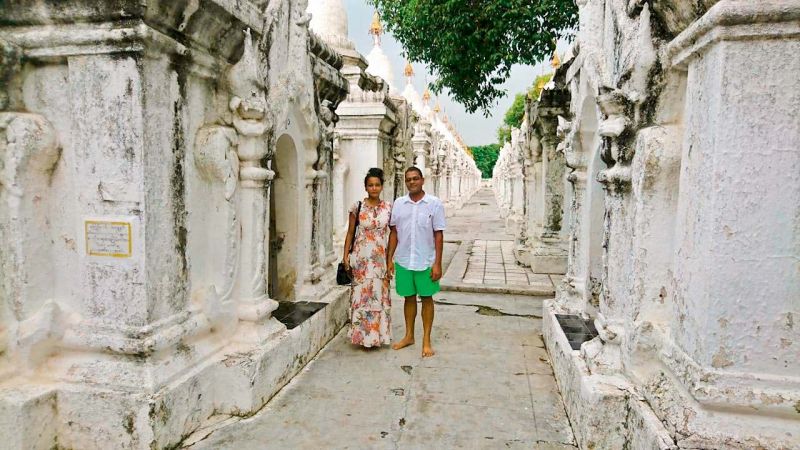 Yashoda and Paul
Yashoda and Paul
Touching down towards Yangon, our point of entry into Myanmar, one can hardly miss the great expanse of the ubiquitous, mighty, muddy Irrawaddy river, the lifeline of Myanmar, criss-crossing it's way throughout the entire landscape. Glints of gold catch the eye from the numerous guilded pagodas, scattered all across the city, built as a token of faith and thanks. The drive from the airport towards our hotel located just 500 metres from the famed Shwedagon pagoda, took us through scores of parks, lakes, markets and the Army General's house, a heavily barricaded fortress. This has been the the centre of power in Myanmar since 1962 and continues to wield tremendous say in the country's politics. Myanmar was welcoming in its sights of cleanliness, vibrant colours of it's womenfolks outfits— the longyi or sarong and the yinzi-a matching blouse buttoned in front, faces smeared with Thanaka wood paste intended to protect their complexion from the sun and the inviting aromas that wafted through the streets, of food in preparation.
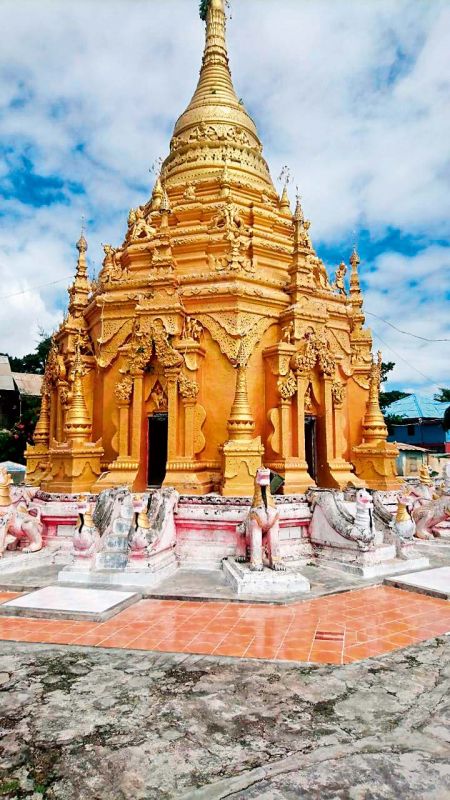 The lone Pagoda in Thayet Myi
The lone Pagoda in Thayet Myi
Lunchtime and we headed to Aung Thukha restaurant, in anticipation of a typical, authentic Burmese meal. We were greeted with a chorus of “Mingalabar” with folded hands, meaning ‘auspiciousness to you.’ A wide range of dozens of Burmese curries with fish, chicken, pork, beef, goat and vegetables like bamboo shoots, pumpkins and okra awaited us. All tourists pay for is the curries we choose. It is served with huge bowls of rice, garnish salads of raw greens and tender vegetables, stir fried morning glory, bowls of fish soup and Laphet Thonk, the famous pickled tea leaf salad comprising peanuts, dried fish pieces and fresh chillies. For dessert, we were handed a wooden box containi hard jaggery balls.The extravagant meal cost about 6000 kyats (1000 kyats=1 USD).
A visit to the Shwedagon pagoda is compulsory. It is the most religious Buddhist site in Myanmar with the chedi (dome with spire) measuring 99 metres which makes it visible throughout Yangon. Entry is 8000 kyats per foreigner, including the elevator ride to the top. Dress rule is strict. No shorts or sleeveless clothes are allowed. Entry to the some pagodas atop is restricted to local men only. Bathed in gold, the domes are rumoured to contain precious stones and tons of gold. Locals throng the pagoda to perform rituals all day. The energy of the place and peace it offered was unparalleled. We visited the Chaukhtatgyi Paya where a 65 metre long reclining Buddha is housed. A beautiful monument, chiselled to perfection on all angles, with enormous feet engraved with scriptures, this is a place where people come to sit in front of the Buddha for hours just gazing at it's magnificence. A trip to the local market where vendors dotted the streets with carts of fresh fruits, food, flowers and vegetables was next. By night, we returned to the Shwedagon pagoda totally illuminated, and sat with the retiring monks who showed us pictures of their youth. They carry all their possessions in a cloth bag around their neck. The Myanmar bug had bitten us.
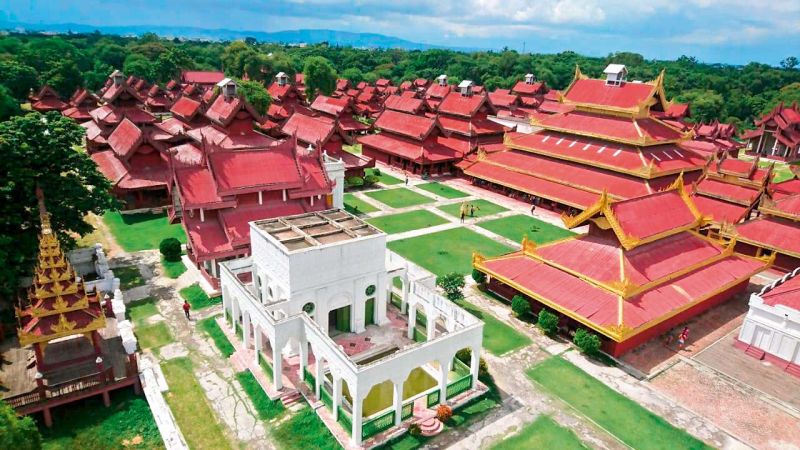 The Mandalay Palace
The Mandalay Palace
Not forgetting the reason of our visit, we found a travel agency and walked in to be greeted by gentle people, impeccable in their local dress. They were efficient and gave us a minivan with a driver to take us to Thayet Myo. Translated to Mango town, it was about eight hours by road. A mining town during the British rule, it had been abandoned and is one of the places in Myanmar untouched by progress. Transport to the remote village was sparse and there were no hotels to lodge us. Frantic with worry at having to skip this crucial trip, we reached out to a Colonel friend in the Burmese army, who responded instantly that a doctor from that village had made arrangements for lodging at a guest house. Greatful for this divine intervention, we set off to Thayet Myo, not knowing what to expect.
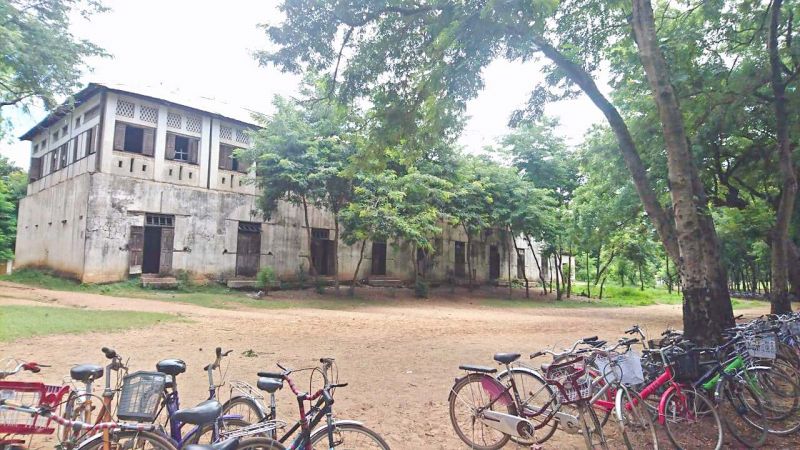 St Marys school at Thayet Myo
St Marys school at Thayet Myo
Eight long hours later, we entered a long, lonely mud road where a broken down bus stood. The transition from developed Myanmar to an untouched part was glaring in the absence of vehicles, concrete buildings or towering pagodas. From a distance, we saw the thick metal rails suspended in the air with carts meant to carry the mined ores, left dangling and eaten by rust. The mighty Irrawaddy sprang into our sight, winding it's way through large wooden houses suspended on stilts. It's inhabitants were bathing in the river by the dozens. The entire town had a handful of concrete two storeyed buildings. Our guesthouse was one of them. We left our bags and went about the work we had set out to accomplish. Within minutes, a large congregation of volunteers gathered around us, unable to converse in English but eager to find anything that could help us trace the roots of my friend's father. We were taken to the missionary school that still existed and is known as the St Marys school now.
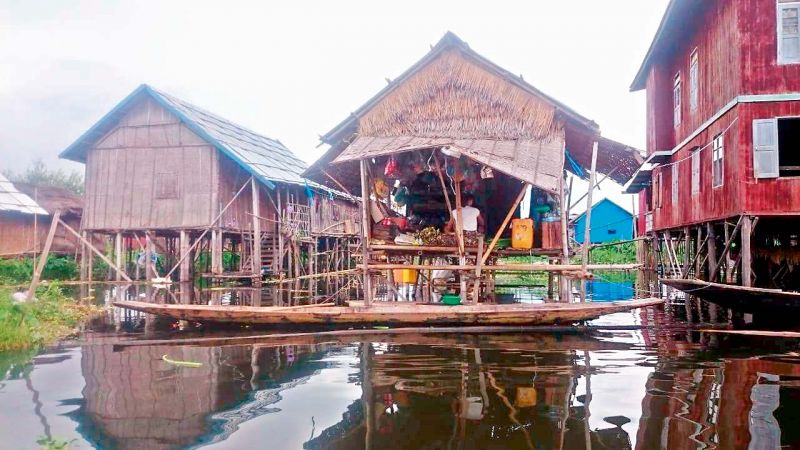 Floating houses of Inle
Floating houses of Inle
Nostalgia swept through us, as we grappled with the triumph of finding something we could cherish for the rest of our lives; imagining life in the large wooden houses on stilts, devoid of furniture but strewn with carpets to shield them from the cold of the Irrawaddy flowing steadily underneath them. All records, we were told was destroyed. We walked around the abandoned streets into the gullies, past the prison that existed then and towards the river and the one pagoda the town held. Our trip had paid off. We moved onto Bagan the next morning, another six hours by road.
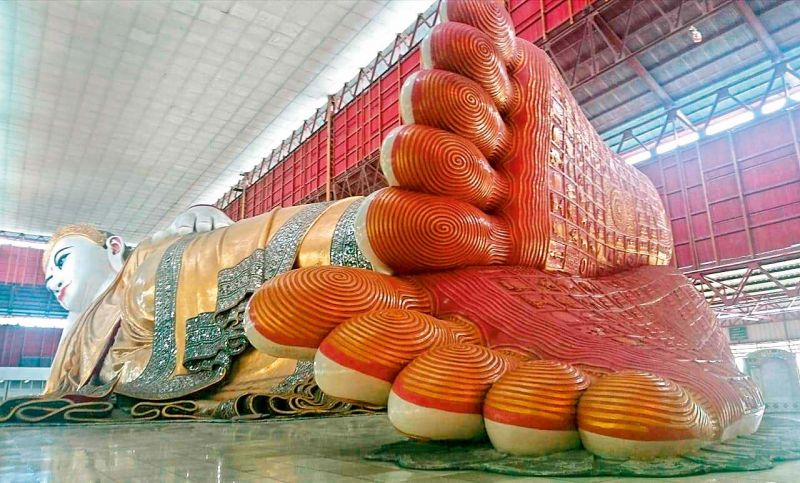 Reclining Buddha at Chaukhtagyi
Reclining Buddha at Chaukhtagyi
Bagan, an ancient city on the Eastern banks of the Irrawaddy river has over 2000 Buddhist monuments spread over green plains, sprouting with shrubs and bushes. Most are made from red bricks laid impeccably to form rooms that house a statue of Buddha and well constructed domes, and this contrast from the gold guilded pagodas found in Yangon, is evident as soon as we enter Bagan. There’s a monument every few hundred metres apart. The Ananda temple, built in 1091 is the most famous, with a golden stupa that can be spotted from miles. The streets are clean, large and renting a two wheeler enabled us to ride through the rocky plains to access most of the monuments. Another monument, the Dhammayangyi temple is a place to visit. By hiring a taxi we also visited Mount Popa, a golden monument where we climbed 777 steps to reach the top, pestered by monkeys all the way. The people of Myanmar have reverence for Lord Buddha and if there is one thing they are intolerant of, it’s disrespect for their religion. We soon heard stories of a Dutchman thrown into prison a few weeks before, for pulling the plug of the amplifier used to relay Buddhist chantings throughout the night. He was agitated because of the disturbance, but his act amounted to extreme disrespect. After three beautiful days of expansive riding through Bagan, we left for Inle Lake by domestic flight.
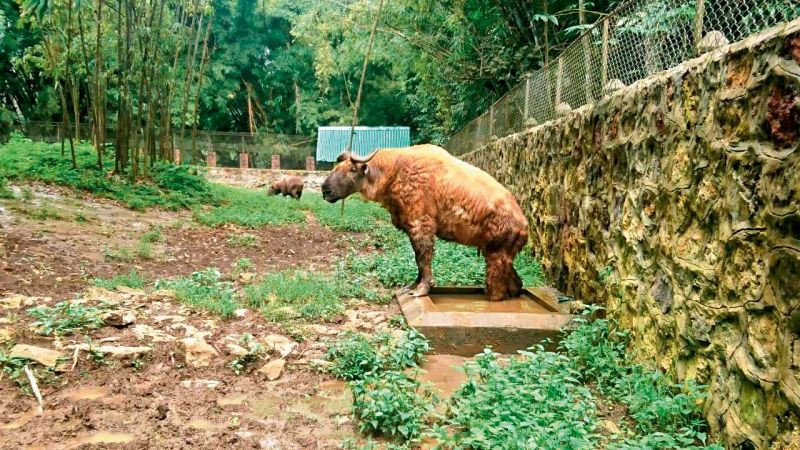 An animal at Takin
An animal at Takin
Inle lake is the second largest lake in Myanmar. It a a freshwater lake located in Taunggyi district of Shan state. The average water depth of the lake is about 7.5 feet and can go upto 12 feet in the rainy season,which explains how the villages and pagodas are built on the lake and lake shores with the help of bamboo stilts, wood and bamboo mats. It's people known as the ‘Intha’ are basically farmers and fishermen. Removing weeds from the bottom of the lake, they use it to form beds fastened to the bottom of the lake by bamboo poles, to make their gardens, which are flood resistant as they rise and fall with the tides. This art known as hydrophonics, sees them growing food and rice sufficient for themselves. Transport through Inle lake is by long, slim motored boats. A trip across the lake and we come across the lone fisherman on a long boat who uses the unique method of tying one leg to the oar to row while resting his other on the stern of the boat, thereby freeing his arms to cast the net. Inle Lake was very peaceful, interspersed by mellifluous Buddhist charts that emerged from the distant hills at night, to transport us into a trance like state. Our next stop was Pyin oo lwin. We travelled by taxi, a four hour drive to get there.
Pyin oo lwin, is renowned for its spacious botanical garden which comprises the butterfly museum, petrified museum, fossil museum, the orchid garden and huge bamboo trees that creak while they grow. We saw the Takin, a giant goat species,weighing hundreds of tons that feed on raw carrots and cabbage. Pyin oo lwin is also famed for its waterfalls. Our friend Rippon Bhalla met us with news about the Rohingya crisis that had just erupted, warning us to stay away from Rakhine state where we were scheduled to visit next. The crisis had just begun and the exodus of the Rohingya people to Bangladesh had started. Confused to hear a new name that could be easily mistaken for ‘Mohinga’, a breakfast dish indigenous to Myanmar and touted as the breakfast of champions —vermicelli in a fish soup broth of garlic, ginger, onions, boiled egg and banana blossoms, the point was driven home of the delicate nature of the developing situation when I warned not to ask for Rohingya instead of ‘Mohinga’ the next morning.
Our last stop was Mandalay, made immortal by the poem, The road to Mandalay by Rudyard Kipling. It was the former royal capital located on the Irrawaddy river in Northern Myanmar. A city of contrasts which has bustling crowds, innumerous buildings, vehicle jammed streets on one side and on the other, the spacious Mandalay palace surrounded by a moat that leads to many famous pagodas and to the Mandalay hills, through which views of the entire city can be seen from atop. The Mandalay palace showcases the King’s bedroom, his court chambers, his deputies bungalows, and gives us an insight into the elaborate planning and architectural skills of the Konbaung dynasty. The Kuthodaw pagoda at the foot of the Mandalay hills is a breathtaking sight with rows and rows of hundreds of small similar white ornately designed monuments that each house Buddhist scriptures inscribed on white marble slabs in ‘Pali’. It is a refreshing change from the golden hues of the pagodas of Yangon, the brick red images of Bagan, the maroon and gold of the Palace.
For us, it epitomised Mandalay as pure heaven, and Myanmar as a magical country that heralds a new era, where tourists have begun to trickle in to experience it's rich culture, the gentle innocence of it's people, the fantastic food and the greatness of the complexity of a nation that manages to hold hundreds of different ethnic groups in its ambit, as it moves forward to seal it's place in the globe. We bid adieu to this beautiful country with a grand dinner at Mingalabar restaurant. Auspiciousness to you all!
Fact File
1) One can enter Myanmar for 28 days with an Indian passport, The single entry e-Visa is valid for 90 days. You will only be able to enter the country through the Yangon, Mandalay and Nap Pyi Taw international airports.
2) Shwedagon Pagoda: , this site is considered the most sacred for Buddhist can be seen from anywhere in the city.
The writers are travel buffs, who love criss-crossing across the globe
